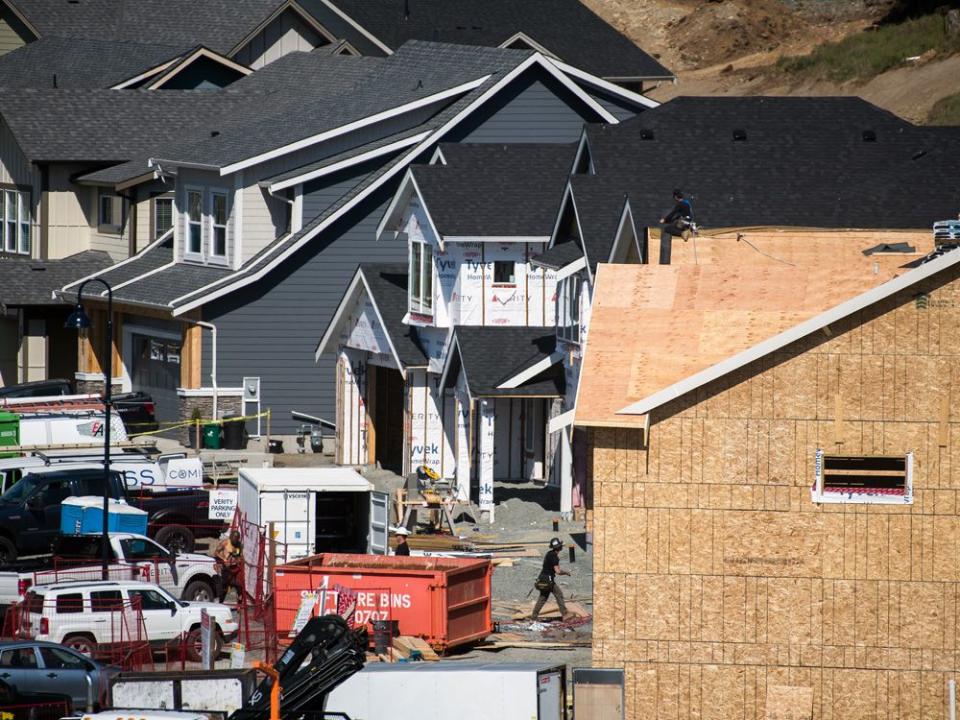Housing inventory may reach crisis point in major Canadian centres, report finds

Inventory levels in major Canadian housing markets have been dwindling over the past decade, with active listings in July running below the 10-year average in most cases, according to a report released Monday by Re/Max Canada.
The organization’s Housing Inventory Report report, based on Canadian Real Estate Association data and insights from the Re/Max network, examined active listings in July from 2013 to 2022 in eight Canadian centres and found inventory levels have fallen short of the 10-year average in seven of them in 2022.
Double-digit declines were noted in Halifax-Dartmouth (65.5 per cent below the 10-year average); Ottawa (almost 42 per cent); Montreal (40 per cent, from a nine-year average); Calgary (26 per cent); Winnipeg (23 per cent); and Greater Vancouver (16 per cent). The housing inventory shortage was less-pronounced in the Greater Toronto Area, where it was down almost seven per cent from the 10-year average. Hamilton-Burlington was the only market to buck the trend, landing at 3.2-per-cent above average.
Christopher Alexander, president of Re/Max Canada, said population growth has played a significant role in depleting inventory levels from coast to coast over the past decade, triggering chronic housing shortages in large urban centres that have resulted in “mini boom and bust” cycles.
“If we don’t move now to build more housing in the current lull, it’s expected that this same scenario will continue to resurface over and over again,” Alexander said in the report.
A crisis is looming, but the outcome is not cast in stone
Christopher Alexander
Canada experienced double-digit population growth between 2006 and 2021, a trend that is expected to continue given Ottawa’s commitment to welcome 1.2 million newcomers into the country between 2021 and 2023 as part of an immigration strategy aimed at propelling economic growth and reducing labour shortages. However, in the context of the housing stock shortage, the rising numbers of new Canadians combined with an increase in household formation overall, are expected to intensify the inventory shortfall further.
A recent report from the Canada Mortgage and Housing Corporation (CMHC) concluded that the country would need to build 3.5 million new homes by 2030 to improve affordability, yet Canada is averaging only 200,000 to 300,000 new units per year.
“During this window of softer demand, building efforts should be ramped up, not down. The offshoot effect is straining rental markets and contributing to ever-rising levels of homelessness throughout the country,” Alexander said.
Meanwhile, CMHC noted a decrease in the seasonally adjusted annual rate of housing starts in Canada’s urban areas in July 2022, driven by lower starts in the single-detached category. Stronger declines in multi-unit residential starts were registered in Vancouver, while a substantial slow-down occurred in both multi-unit and detached residential starts in Montreal.
Yet, the trend is perhaps most pronounced in the country’s largest housing market — the Greater Toronto Area. According to a second quarter Condominium Market Survey by real estate research firm Urbanation Inc., approximately 35,000 new condo units were originally expected to launch for pre-construction sale in the GTA in 2022. While close to 16,000 units were launched in the first half of the year, fewer than 10,000 units are now expected during the remainder of 2022, suggesting that 10,000 units have been shelved.
Mortgage stress test in focus as rate hikes ratchet up pressure on borrowers
Single-family home prices in Montreal down nine per cent since April
Toronto real estate board wants OSFI to revisit stress test as home sales volumes tick up
Falling real estate prices may be adding to the current pressure on inventories, creating a disincentive for new construction.
TD Bank economist Rishi Sondhi predicts that “the average price of a home in Canada could fall between 20 and 25 per cent from its peak seen earlier this year” by early 2023, but that there is a likely a floor on how low they can go.
“Several factors … will help cushion housing demand and prices — the fastest rate-hike cycle in decades, growing consumer incomes and excess savings and low inventories in the new and resale markets,” Sondhi wrote in a recent report.
Other Industry watchers have cited a number of factors emerging to create a perfect storm that will keep housing scarce now and in the future, including inflation and rising interest rates, increased global supply-chain interruptions, swelling construction costs and a serious shortage of labour in the skilled trades, as well as high land acquisition costs and slow municipal approval processes.
“The trouble is that housing development is a slow process, and experience tells us the only thing slower might be government processes,” Alexander said. “Removing barriers and cutting red tape is necessary. A crisis is looming, but the outcome is not cast in stone. There is a short runway to reverse course before the impacts become very real for Canadian home buyers and renters.”
• Email: shcampbell@postmedia.com

 Yahoo Finance
Yahoo Finance 